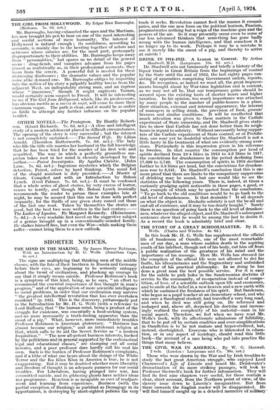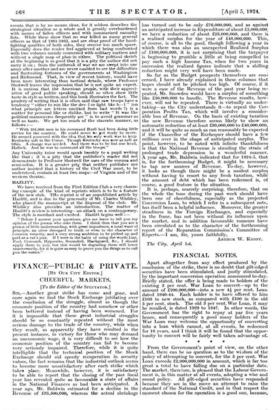THE CIVIL WAR IN AMERICA. By W. G. Shotwell. 2
vols. (London : Lotigmans and Co. 36s. net.) THE CIVIL WAR IN AMERICA. By W. G. Shotwell. 2 vols. (London : Lotigmans and Co. 36s. net.) Those who were drawn by the War and by Irish troubles to study the last great American struggle, -win) enjoyed Lord Chamwood's Life of Lincoln and heard Mr. Drinkwater's dramatization of its • more striking passages, will look to Professor Shotwell's book for further information. They will find its first nine chapters very useful, for these contain a clear, short account, from the Northern point of view, of the slavery issue down to Lincoln's inauguration. But from there onwards the English reader will be disappointed. He will find himself caught up in a detailed narrative of military' events that is by no means clear, for it seldom describes the strategical situation as a whole and is greatly overburdened with names of fallen officers and with summarized casualty lists. While these show that no war killed as many general officers as that of 1861-1865, and are clear proof of the hard- fighting qualities of both sides, they receive too much space. Especially does the reader feel aggrieved at being confronted with two volumes mainly concerned with military matters and without a single map or plan-in-either. The political sketch at the beginning is so good that it is a pity the author did not carry it on ; from the outbreak of war we are swept into one army after another and are never enabled to see the difficulties and fluctuating fortunes of the governments at Washington and Richmond. That, in view of recent history, would have been more interesting than tactical details, where Professor Shotwell leaves the impression that he is not quite an expert. It is curious that the American people,. with their appreci- ation of good public speaking, should so often show little taste in style as written, and this book illustrates the fact. The prudery of writing that it is often said that raw troops have a tendency " either to niri like the dev-1 or fight like h-1 "'(on what principle are letters omitted from bad words ?) is a matter for personal like or dislike, but to write " It was like political manoeuvres frequently are " is to avoid grammar as well as taste. We get too much of the staccato manner, as follows :— " With 101,000 men in his command Buell had been doing little service for the country. He could never be got ready to move. He seemed possessed with the idea that his only work was to keep Kentucky safe in the Union. Though Kentucky was sow as safe as Ohio. A change was needed. And there was to be but one head, tialleck. And he was to command all the troops."
Any University tutor would speak hai:shly to a pupil writing like that ; it is a pity that the publisher's reader did not demonstrate to Professor Shotwell the uses of the comma and semi-colon. It is a greater pity that neither publisher nor author insisted that a history of the Civil War must, to be understood, contain at least two maps—of Virginia and of the western theatre.



























































 Previous page
Previous page